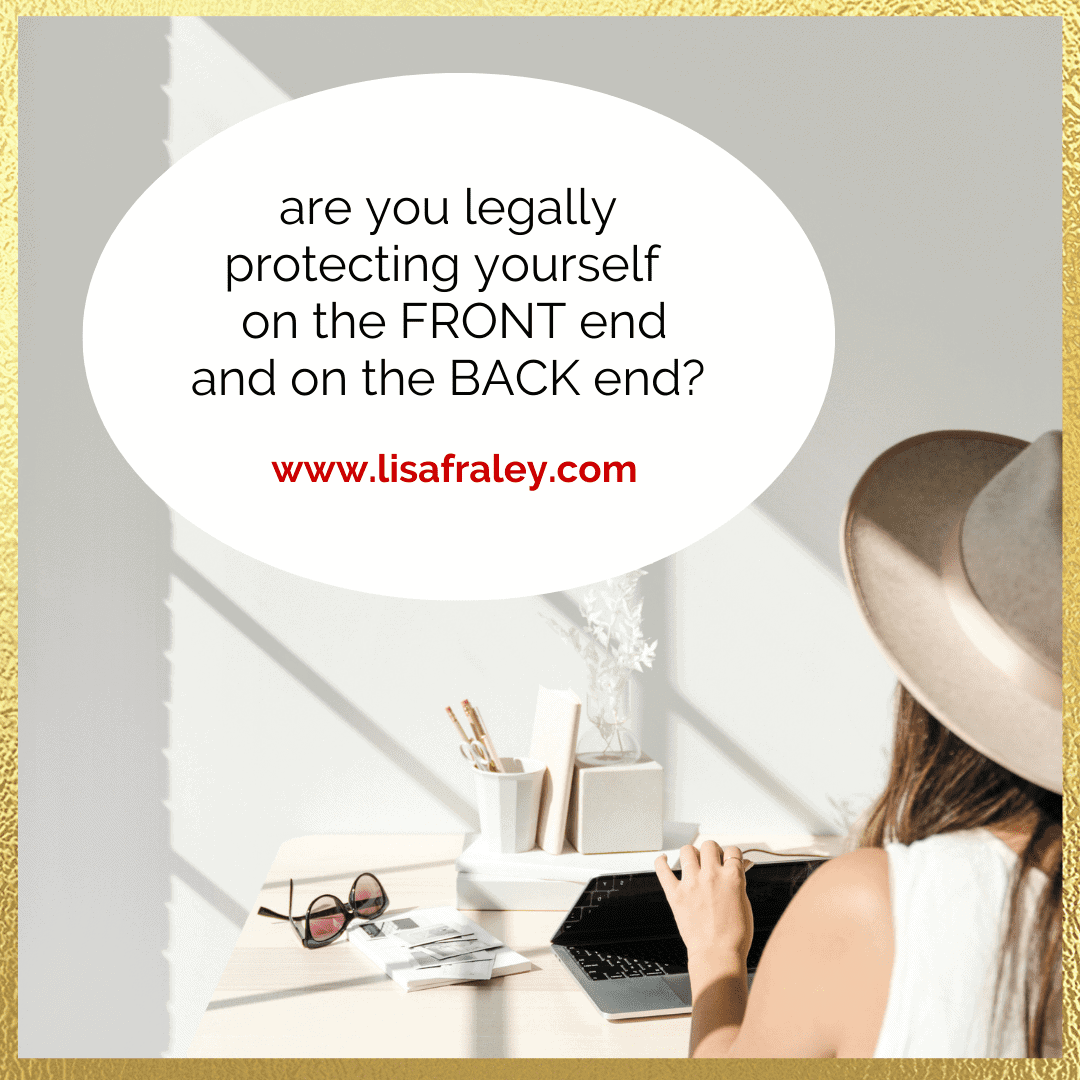Have you done these 3 things to legally protect your biz?
My team gets this question every week in Legal Chats from clients who are scared that they’re legally exposed and unprofessional:
“What do I need to do to protect my business on the legal front?”
While it often depends on the situation, you want to:
1. Protect yourself on the FRONT end to limit your liability, reduce your risk, and cover your buns BEFORE something goes wrong.
AND
2. Protect yourself on the BACK end to help you reactively AFTER you find yourself in a legal pickle.
How do you protect yourself on the FRONT end?
Use contracts and legal terms.
Contracts are the BEST starting point to reduce your risk and limit your liability because you both sign a contract and agree to terms BEFORE something goes wrong.
Contracts can contain sections addressing “Disclaimers,” “Limitation of Liability,” and “Release of Claims” which say things like you’re not liable for your client’s actions or decisions after taking your course or program.
Most contracts include language to reduce your risk. That’s why you want to use contracts / legal terms like a:
- Client Agreement – for your 1-on-1 clients
- Website Disclaimer – for your website
- Website Terms & Conditions – for your website
- Terms of Use – for your group programs & online courses
- Independent Contractor Agreement – for your team members
- Overnight Retreat Agreement – for your client retreats
Contracts protect both you AND your clients by making sure you’re on the same page at the outset.
Question for you: Are you using contracts in your business? Do they have Disclaimer, Limitation of Liability and Release of Claims sections?
(In case you’re wondering, all of our DIY Legal Templates include disclaimers and legal language to limit your liability. If you need updated or new contracts, check out the 47+ DIY Legal Templates, including all of the ones mentioned above, right here.)
How do you protect yourself on the BACK end?
Use insurance and have an LLC/S-Corp.
Be sure you have legal protection after something happens, as my client says, “so you aren’t standing there with your buns exposed!”
Insurance and LLCs and S-Corps protect you reactively because the legal protection kicks in AFTER someone comes after you.
1. Get professional liability insurance.
Professional liability insurance is not legally required for most coaches or online entrepreneurs like it is for licensed practitioners like doctors and nurses.
However, it’s a good idea for most biz owners to have because it can cover you if you make a mistake or something goes wrong while you’re working within the scope of your profession.
For example, if you’re a health coach, it can cover you when working with your clients (provided you’re not violating others’ scopes of practice, like dietetics or medicine). If you’re a fitness instructor, it can cover you while you’re training your clients in person or through online classes.
It can give you the option to file a claim and receive reimbursement. But, each insurance policy is different so be sure to read the fine print and talk with an insurance agent to be clear about what’s covered and what’s not.
Just like your car insurance or your health insurance, it gives you peace of mind if something goes wrong.
Question for you: Do you have professional liability insurance? Do you know what your policy covers?
If you need insurance, I highly recommend Alternative Balance – a company that offers liability insurance & business tools to health coaches/nutrition consultants, life coaches, yoga teachers, fitness instructors, Ayurvedic practitioners, beauty consultants, body workers and more. I know the owner personally and it’s a great company!
2. Cover your assets with an LLC or S-Corp.
Another way to protect yourself on the back end is with a corporate entity like an LLC or S-Corp to protect your personal and business assets.
“Going pro” and stepping up from being a sole proprietor to forming an LLC or S-Corp helps limit your liability by keeping your personal and business finances separate.
This is important because if, generally speaking, you’re sued for business reasons, no one can come after your personal assets (like your house, checking account, and investments).
And if someone comes after you in your personal life, they can’t access your business assets (like your business bank accounts).
Having an LLC or S-Corp is one of the best ways to protect your loot.
Question for you: Do you have an LLC or S-Corp? If not, is it time for you to create one?
If you’re not sure, check out this easy DIY Legal Master Class here to learn more about whether it’s the right time to form an LLC or S-Corp.
As you can see, while all 3 of these legal steps are different, each is important in its own way since each one protects you at different times.
Remember…
Contracts are a proactive way to get legally covered because you are laying out the terms BEFORE you begin your work together.
Insurance and LLCs / S-Corps are reactive ways to get legally covered because your legal protection doesn’t kick in until someone comes AFTER you.
Have questions about your particular situation? Book a free 20-Minute Legal Chat here and we’ll point you in the right direction.
Here’s to protecting yourself and your biz on both the front AND the back ends!



